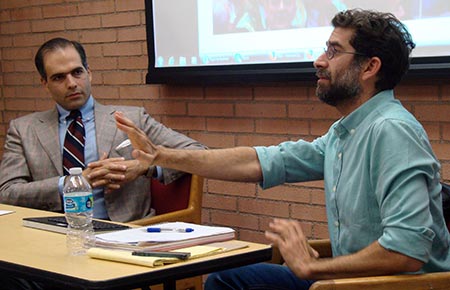
USC Dornsife experts seek answers as Turkey reels from recent coup attempt
Two months after the attempted military coup in Turkey against the government of President Recep Tayyip ErdoÄŸan, the world is watching as the alarming fallout continues. ErdoÄŸan has overseen a purge of more than 100,000 people accused of being disloyal to his Justice and Development Party (AKP) government and affiliated with the Gülenists, a religious and social movement promoting moderate Islam and led by exiled cleric Fethullah Gülen. ErdoÄŸan believes the Gülenists to be the masterminds of the coup.
The purge has subjected a vast cross-section of Turkish citizens — drawn from the educational, judicial, military and business sectors — to what has been likened to a “witch hunt.” Having declared a state of emergency in Turkey, ErdoÄŸan’s executive privileges are stronger than ever, straining political and diplomatic relations both domestically and internationally.
On Sept. 19, the Middle East Studies Program hosted an event titled “Spotlight on Turkey” on the University Park campus to shed some light on this very complicated situation. Panelists Veli N. Yashin, assistant professor of comparative literature at USC Dornsife, and alumnus Mehmet Sinan Birdal of Istanbul’s Isik University, who this year is serving as visiting assistant professor of international relations and Middle East studies, offered their insights as experts on the country and speculated on what its future might hold.
Yashin on the shifting relations between religious and secular forces in Turkey:
“By now many of you will have guessed that the alliance between the AKP and the Gülenists, which seems to have lasted throughout the 2000s with only minor interruptions, [was not borne of] a natural Islamic affinity but resulted from a convergence of mutual strategic interests. The Turkish military has long taken itself to be the vanguard of the authoritarian secularism of the republic, and to be fair, was also understood to be the primary guarantor of political stability in Turkey by a not insignificant portion of its own citizens, but perhaps not by the silent majority, to put it in terms that will be uncannily familiar to American politics.”
Birdal on the unclear role of the presidency in contemporary Turkey:

Assistant Professor of Comparative Literature Veli Yashin, left, listens to his colleague Visiting Assistant Professor Mehmet Sinan Birdal during the Sept. 19 panel discussion. Photo by Laura Paisley.
“So you have president Erdogan, the first president of Turkey elected by the people, because prior to Erdogan, presidents used to get elected by the parliament and not by the popular vote. This has created a problem of legitimacy. Who represents the people, the parliament or the president? The presidency, according to the Turkish Constitution of 1982, designed by the military after the coup in 1980, was supposed to be … a position of tutelage for the military — the military would induce elections and start the democratization process within two years so there would be a parliament, a cabinet, a prime minister and everything would look like the transition to democracy was occurring — but at the same time, the military wanted to be able to control the whole process through the office of the president.”
Yashin on the fallout since July and the “punishments” being implemented:
“There had been an ongoing purge that preceded the attempted coup itself. So the idea that specific actors who were directly involved with the attempt are being punished is a fiction. All the purges right now, in the name of cleansing these institutions of the state as well as the educational, judiciary and military sectors, have very clearly affected people who had nothing to do with Fethullah Gülen as a person or his movement as a social force.
“As ErdoÄŸan called it right after he landed in Istanbul, this coup attempt was ‘a gift from God.’ It was basically used to intensify what was already an ongoing process. But yes, the numbers are unprecedented, [the purge] involves tens of thousands of people in every sector involved. The AKP seems to have a good grasp on utilizing and mobilizing the apparatuses that are already in place. … These existing structures can be used to persecute not just any particular actor but everyone who may be considered a political opponent.”
Birdal on Turkish involvement in Syria:
“The Syria [situation] is another tool for ErdoÄŸan to use to create his regime. As long as the Syrian crisis lingers, I think the Turkish crisis will linger, as well.
In terms of finances, as long as the Federal Reserve is keeping the interest rates on the dollar down, that means free money is flowing everywhere, and [the Syrian crisis is about] speculation and making money. … ErdoÄŸan is still getting his money from the international financial centers.”
Yashin on Turkey’s contemporary identity crisis:
“In many ways Turkey seems to be facing a constitutional crisis, a foundational crisis similar to what they faced in the 1920s. We don’t quite know yet whether it’s going to survive or a new Turkey will emerge out of the ruins of this process. So perhaps [ErdoÄŸan’s] rhetoric of ‘a new Turkey’ is becoming a little more real than the government expected. The country will need to redefine itself, but what has happened so far does not look very promising in that regard. There are no future prospects for integration of the minorities that already exist in Turkey and, it seems, no reconciliation with these minorities, who have been persecuted and killed during what is now approaching a 100-year history.”
Birdal on the coup’s effect on international relations:
“The coup attempt strengthened ErdoÄŸan’s hand, in general…Now everyone is waiting for the U.S. elections — everyone wants to see what the next U.S. president is going to do in Syria. That’s up for grabs.”